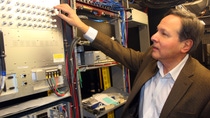Media
Quantum chemistry – forecasting chemical reactions

Anthony Debellis has been contributing to chemical research for more than 30 years, though he rarely spends his time in laboratories these days. The quantum chemistry scientist uses the capacities of BASF’s supercomputer Quriosity to explore molecules and simulate thousands of experiments. Like a weatherman for chemistry, he predicts the outcome of chemical processes before the actual experiment is brought to the lab.
Anthony, what type of scientist are you?
I used to work as an experimentalist for surface spectroscopy until I was introduced to the world of molecular simulations and quantum chemistry. While a scientist in the laboratory makes measurements of molecules, I discover the properties of molecules, how they interact and how they can be improved with the help of digital tools. In simulation, we build models of chemical compounds on a computer using the laws of physics. These laws are encoded in the form of mathematical equations and, based on those, we can make predictions of the performance or property of a molecule.
It's like making a weather prediction – while meteorologists run models of atmospheric interactions to predict the likelihood of rain, molecular simulators run multiple approximations of chemical compounds to predict an experimental outcome. Just like the weather prediction that simulates the movement of clouds or particles in the atmosphere, we predict molecular interaction and the results of chemical experiments.
What was a successful prediction you made?
I supported an R&D project for ultraviolet absorbers, which are used in coatings and paints in the automotive industry, as well as for sunscreens and personal care products. With the help of quantum chemical simulations, I was able to explain how these materials work and how we could improve them. This resulted in the development of specific application products within BASF’s Tinuvin line of stabilizers. What was most rewarding for me was that – besides playing a major part in the product development – I was able to co-author on several patents of these materials. This is somewhat difficult and rather uncommon for a quantum scientist who works on a computer.
Quantum chemistry strives to accurately predict chemical and physical properties of molecules and materials, which is useful to many fields of science and engineering. Predicting chemical properties using a first principles approach at the atomic scale is a theoretical and computational challenge.
What is the advantage of molecular simulation?
There are plenty of advantages of quantum chemistry. Laboratories and experiments are expensive. In some cases, depending on the materials that you work with, they can also carry potential dangers that need to be carefully managed. Furthermore, there are phenomena that are either very difficult or even impossible to understand with experiments. Simulation can help explain chemistry on the atomic level, and it is particularly useful in research areas that would otherwise be very expensive, potentially dangerous or the experiment to find the desired information does simply not exist.

The combination of quantum chemistry and experimental research is key. With molecular simulation, we can simulate thousands of materials and harvest from those the most promising ones as a funnel approach, narrowing it down from 1,000 to 10 materials. These remaining materials can then be further tested in an experimental study in the laboratory.
Do you miss the lab?
I don’t. My workplace is the digital world and most of my research happens on computers. Not ordinary computers – the hardware we use for quantum chemistry is quite advanced. We work with supercomputers, such as BASF’s supercomputer Quriosity. BASF invested in this technology in 2017, and the decision has underlined our company’s strong commitment to this important research approach.
I have a real passion for quantum chemistry and molecular simulation, I absolutely fell in love with it. For sure, there are limitations, just as there are for weather predictions. Sometimes they say it's going to rain, but it doesn't. But these simulations are getting better and better every day and I love being a part of it. The computer power is constantly increasing, and our supercomputer helps us to improve research to make it more efficient and reduce risks.
How digital is your private life?
I feel I'm competent when it comes to digital matters, as I need to be, and my personal life is high on the digital capabilities. Online banking, smart home features – I’m all set. At the same time, I’m a hands-on person with some aptitude for fixing things. If something doesn't work, my wife will take it and put it in the trash, whereas I will take it apart and just try to fix it. I can spend hours and hours on something that costs only $10. But it's the satisfaction of fixing it with my hands, without a computer!
For media inquiries and questions, please contact: katharina.meischen@basf.com.